上海牛津英语六年级预初英语知识点整理一完整版
上海版牛津英语六年级上下全重点知识点复习整理1
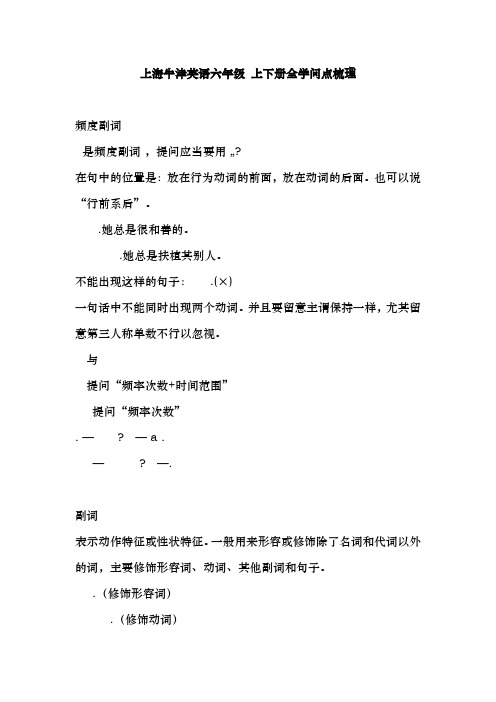
上海牛津英语六年级上下册全学问点梳理频度副词是频度副词,提问应当要用…?在句中的位置是:放在行为动词的前面,放在动词的后面。
也可以说“行前系后”。
.她总是很和善的。
.她总是扶植其别人。
不能出现这样的句子:.(×)一句话中不能同时出现两个动词。
并且要留意主谓保持一样,尤其留意第三人称单数不行以忽视。
与提问“频率次数+时间范围”提问“频率次数”. —? — a .—? —.副词表示动作特征或性状特征。
一般用来形容或修饰除了名词和代词以外的词,主要修饰形容词、动词、其他副词和句子。
.(修饰形容词).(修饰动词), .(修饰句子)形容词后面构成副词:—————————介词…?你和你的…还干什么?是个介词,后面接人称代词时,要用宾格的形式。
在详细的某一楼层只能用介词,并且第几层还要用序数词 , ,详细的某一天介词只能用,左边/右边的这个中间的这个假如是介词短语修饰,应当要放在后面,假如是形容词应放的中间在周末如今完成时如今完成时的构成是: +动词的过去分词。
去过,到过(表示如今已经回来)住在= /去,到….. (表示如今还没有回来). .I .…? 你去过…..吗?, I … . 是的,我已经去过了。
, I ‟t … . 不,还没有去过。
已经(多用于确定句,放于动词前)迄今,还(多用于疑问句和否认句,放于句末)刚刚(用法和位置和一样). I ’s .’s ?, I ’t ./ ……在…住/待…(时间)+一段时间,多与如今完成时连用表示动作从过去持续到如今的一段时间,并用提问。
代词用来指代一个人或事物,而用来指代一些人或事物。
定冠词定冠词的用法:a. 在球类运动前不加定冠词/ / , .b. 在乐器前必需加定冠词/ , .c. 在中,不加定冠词时辰表达方式/ 9月10日= a 2:15= 3:10= 1:30= 2:40= 30 用了后面就不能再有a a 一个半小时一小时二非常钟.分别表示上午和下午。
上海版牛津英语六年级(上下)全重点
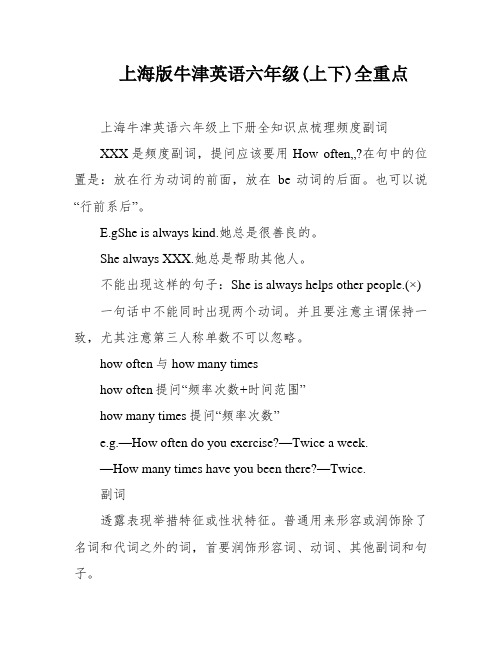
上海版牛津英语六年级(上下)全重点上海牛津英语六年级上下册全知识点梳理频度副词XXX是频度副词,提问应该要用How often…?在句中的位置是:放在行为动词的前面,放在be动词的后面。
也可以说“行前系后”。
E.gShe is always kind.她总是很善良的。
She always XXX.她总是帮助其他人。
不能出现这样的句子:She is always helps other people.(×) 一句话中不能同时出现两个动词。
并且要注意主谓保持一致,尤其注意第三人称单数不可以忽略。
how often与how many timeshow often提问“频率次数+时间范围”how many times提问“频率次数”e.g.—How often do you exercise?—Twice a week.—How many times have you been there?—Twice.副词透露表现举措特征或性状特征。
普通用来形容或润饰除了名词和代词之外的词,首要润饰形容词、动词、其他副词和句子。
XXX happy.(修饰形容词)The old lady is XXX.(修饰动词)Luckily, he got the first prize.(润饰句子)形容词后面+ly组成副词:slow—slowlyslight—XXX—luckilyhappy—happily介词What else do you do with your…?你和你的…还干什么?With是个介词,后面接人称代词时,要用宾格的形式。
With me/him/her/it/us /them在详细的某一楼层只能用介词on,而且第几层还要用序数词On the ground floor, on the first floor, on the XXX详细的某一天介词只能用onOn Sunday, On Sunday morning,On the Open Dayhe one on the left/right左边/右边的这个the one in the middle中间的这个如果是介词短语修饰the one,应该要放在the one后面,如果是形容词应放the one的中间the left/right onethe middle oneXXX XXX在周末目前完成时现在完成时的构成是:have/has +动词的过去分词。
上海版牛津英语六年级上、下全重点知识点复习整理
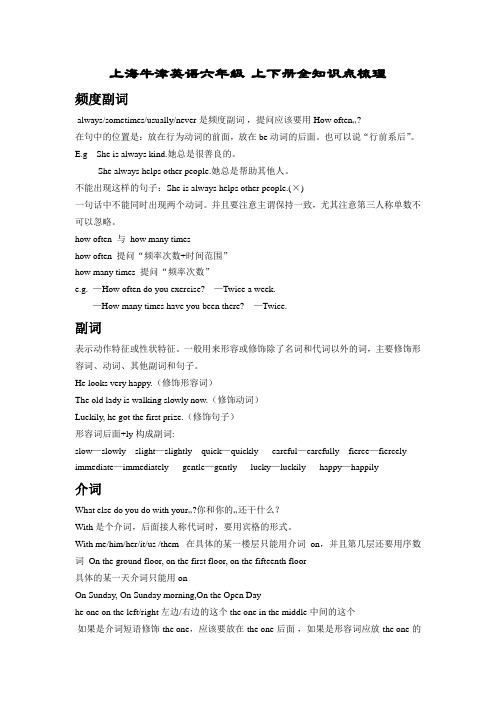
上海牛津英语六年级上下册全知识点梳理频度副词always/sometimes/usually/never 是频度副词,提问应该要用How often…?在句中的位置是:放在行为动词的前面,放在be动词的后面。
也可以说“行前系后”。
E.g She is always kind.她总是很善良的。
She always helps other people.她总是帮助其他人。
不能出现这样的句子:She is always helps other people.(×)一句话中不能同时出现两个动词。
并且要注意主谓保持一致,尤其注意第三人称单数不可以忽略。
how often 与how many timeshow often 提问“频率次数+时间范围”how many times 提问“频率次数”e.g. —How often do you exercise? —Twice a week.—How many times have you been there? —Twice.副词表示动作特征或性状特征。
一般用来形容或修饰除了名词和代词以外的词,主要修饰形容词、动词、其他副词和句子。
He looks very happy.(修饰形容词)The old lady is walking slowly now.(修饰动词)Luckily, he got the first prize.(修饰句子)形容词后面+ly构成副词:slow—slowly slight—slightly quick—quickly careful—carefully fierce—fiercely immediate—immediately gentle—gently lucky—luckily happy—happily介词What else do you do with your…?你和你的…还干什么?With是个介词,后面接人称代词时,要用宾格的形式。
沪教版牛津英语六(上)语法点
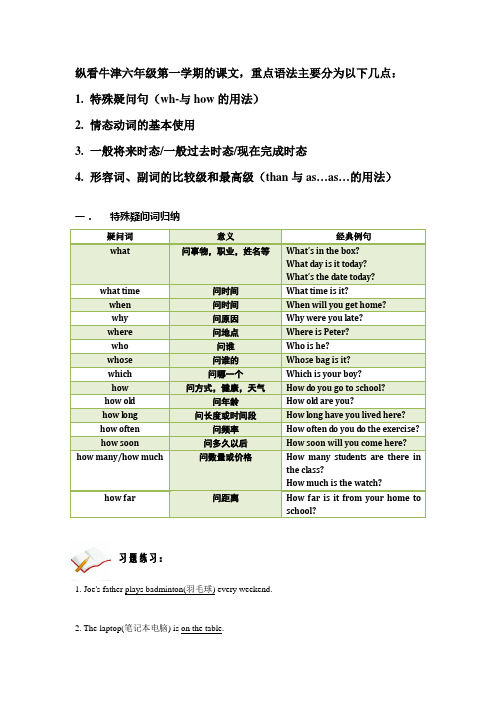
纵看牛津六年级第一学期的课文,重点语法主要分为以下几点:1.特殊疑问句(wh-与how的用法)2.情态动词的基本使用3.一般将来时态/一般过去时态/现在完成时态4.形容词、副词的比较级和最高级(than与as…as…的用法)一.特殊疑问词归纳疑问词意义经典例句what 问事物,职业,姓名等What’s in the box?What day is it today?What’s the date today?what time 问时间What time is it?when 问时间When will you get home?why 问原因Why were you late?where 问地点Where is Peter?who 问谁Who is he?whose 问谁的Whose bag is it?which 问哪一个Which is your boy?how 问方式,健康,天气How do you go to school?how ol d 问年龄How ol d are you?how long 问长度或时间段How long have you lived here?how often 问频率How often do you d o the exercise?how soon 问多久以后How soon will you come here? how many/how much 问数量或价格How many stud ents are there inthe class?How much is the watch?how far 问距离How far is it from your home toschool?习题练习:1. Joe's father plays badminton(羽毛球) every weekend.2. The laptop(笔记本电脑) is on the table.3. My mother is a nurse in the hospital.4. He gets up at 6:30 in the morning.5. Li Lei goes to work on foot.6. It is about 20 kilometers from my home to the town.7. I have lived in Hang Zhou for 20 years.8. I’m looking for my watch.9. The train will start in three minutes.10. Alice has the violin lesson twice a week.11. The building with green wall is the post office.12. He didn’t come because he was ill.注意事项:由于特殊疑问词孩子们从小学就已经开始接触,对于最基本的what/how/where等并不感到陌生,出题的难度一般也不会很大。
沪版牛津英语六年级上知识点归纳总结
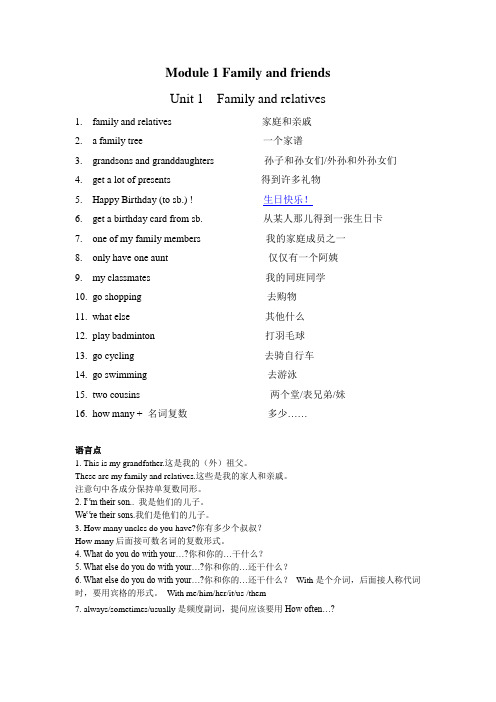
Module 1 Family and friendsUnit 1 Family and relatives1.family and relatives 家庭和亲戚2. a family tree 一个家谱3.grandsons and granddaughters 孙子和孙女们/外孙和外孙女们4.get a lot of presents 得到许多礼物5.Happy Birthday (to sb.) ! 生日快乐!6.get a birthday card from sb. 从某人那儿得到一张生日卡7.one of my family members 我的家庭成员之一8.only have one aunt 仅仅有一个阿姨9.my classmates 我的同班同学10.go shopping 去购物11.what else 其他什么12.play badminton 打羽毛球13.go cycling 去骑自行车14.go swimming 去游泳15.two cousins 两个堂/表兄弟/妹16.how many + 名词复数多少……语言点1. This is my grandfather.这是我的(外)祖父。
These are my family and relatives.这些是我的家人和亲戚。
注意句中各成分保持单复数同形。
2. I‟m their son.. 我是他们的儿子。
We‟re their sons.我们是他们的儿子。
3. How many uncles do you have?你有多少个叔叔?How many后面接可数名词的复数形式。
4. What do you do with your…?你和你的…干什么?5. What else do you do with your…?你和你的…还干什么?6. What else do you do with your…?你和你的…还干什么?With是个介词,后面接人称代词时,要用宾格的形式。
(完整word)牛津沪教版英语六年级上重点知识复习及练习

1.In the writer’s opinion, the most effective way in learning English is ____.A.to practise speaking, writing and feeling itB.to forget your own native languageC.to translate everything into his own languageD.to memorize the English words and grammatical rules2. “Instead of helping you, your own language gets in your way.”This sentence means that memorizing your own language can ________.A.help you to study English wellB.stop you mastering EnglishC.make English easy to learnD.help you notice mistakes3.Eq ually important is to feel the language. “to feel the language” here means________.A.to get a knowledge of English by touchingB.to be able to read and write EnglishC.to translate English into your own by imaginingD.to be able to experience the rich sensation of the languageBWhen we can see well, we do not think about our eyes often. It is only when we can not see perfectly that we come to see how important our eyes are.People who are nearsighted can only see things that are very close to their eyes. Many people who do a lot of close work, such as writing and reading, become nearsighted. Then they have to wear glasses in order to see distant things clearly. People who are farsighted face just the opposite problem. They can see things that are far away, but they have difficulty reading a book unless they hold it at arm’s length. If they want to do much reading, they must get glasses too.Other people do not see clearly because their eyes are not exactly the right shape. This, too, can be corrected by glasses. Some people’s eyes become cloudy because of cataracts. Long ago these people often became blind. Now, however, it is possible to operate on the cataracts and remove them.When night falls, colors become fainter to the eyes and finally disappear. After your eyes have grown used to the dark, you can see better if you use the side of your eyes rather than the centers. Sometimes, after dark, you see a small thing to one side of you, which seems to disappear if you turn your head in its direction. This is because when you turn your head, you are looking at the thing too directly. Men on guard duty sometimes think they see something moving to one side of them. When they turn to look straight at it, they can not see it any more, and they believe they were mistaken. However, this mistake happens because the center of the eye, which is very sensitive in daylight, is not as sensitive as the sides of the eye after dark.4.We don’t know that our eyes are of great importance until ________.A. we think about our eyesB. we cannot see clearlyC. we wear glassesD. we have to do much reading5.According to the passage, a ________ is more likely to be nearsighted.6.People who are farsighted ________ .A.cannot do a lot of close work without glassesB.can only see things that are very close to their eyesC.have difficulty reading a book if they hold it at arm’s lengthD.have the same problem as the nearsighted people7.To see a small thing at night, it is better to look ________ .A.with wide open eyesB.with half shut or narrowed eyesC.straight at itD.in a slightly different directionC Read and answer the questions.It's Sunday today. It's five o'clock in the afternoon. Dick is going to the supermarket with his parents. His father is now cleaning the car. He is going to drive his family to the supermarket. It is far away from their home. His mother is going to buy a lot of food: bread, milk, fruit and drinks. She also wants to buy many other things for the next week. Dick wants to buy a video game machine. His father says to him, 'OK, but you mustn't play video games all the time. After class you must go over your lessons and do your homework first.'They are going to have dinner there and come back at nine o'clock in the evening.They will enjoy themselves very much.( ) 1 Dick and his parents are going to do some shopping today.( ) 2 They are going to the supermarket by bus.( ) 3 The supermarket is not far away from their home.( ) 4 Dick's mother is going to buy a lot of food for the next week.( ) 5 Dick is going to buy a video game machine but he can't play it all the time.( ) 6 They are going to stay in the supermarket for 5 hours.Ⅴ.Choose the right answer.It's Sunday. Mother, father and the children are going to the beach.Alice: Where are we going, Dad?Father. Let's look at the map. Let me see. We will go to the East Point Beach.Mother: We'll swim in the sea.David: Are we going to have a picnic?Alice: Yes, of course.David: That's nice.Father: Come on! Let's all get in the car!Alice: What's wrong (怎么了), Dad?Father: The car can't start (发动)!Mother: So we will all stay at home.Alice: Let's have a picnic in the garden!David: Great!( )1 The family is going to ____________ .A. swim in the seaB. have a picnicC. swim and have a picnic( )2 They are going there ____________ .A. by busB. by carC. by underground( )3 They won't go to the beach ______________ .A. because it is rainyB. because Father is not fineC. because the car doesn't start( ) 4 They will have the picnic ____________ in the end.A. on the beach。
牛津上海版英语六年级上册Unit6知识点及语法点
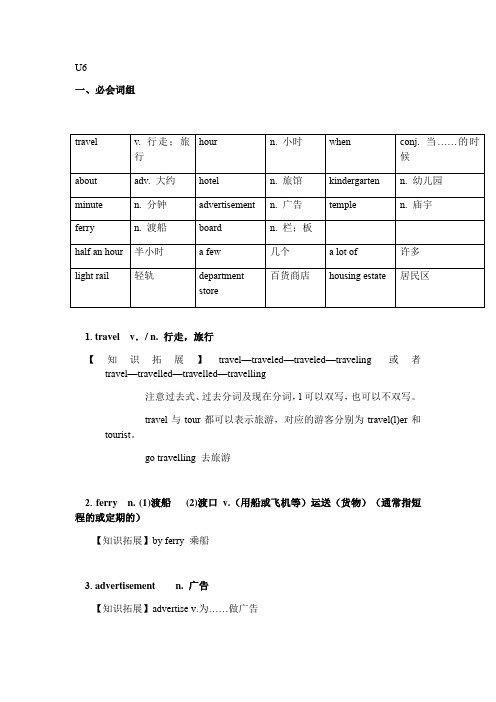
U6一、必会词组1. travel v./ n. 行走,旅行【知识拓展】travel—traveled—traveled—traveling或者travel—travelled—travelled—travelling注意过去式、过去分词及现在分词,l可以双写,也可以不双写。
travel与tour都可以表示旅游,对应的游客分别为travel(l)er和tourist。
go travelling 去旅游2. ferry n. (1)渡船(2)渡口v.(用船或飞机等)运送(货物)(通常指短程的或定期的)【知识拓展】by ferry 乘船3. advertisement n. 广告【知识拓展】advertise v.为……做广告4. board n. 栏;板【知识拓展】abroad adv. 在国外,到国外。
broad adj. 宽广的。
形象记忆board这个单词:首尾bd两个字母想象成船头和船尾,中间oar是一个单词,意思是“桨”,所以board有“甲板,上船”的意思。
5. a few 几个。
a few只能修饰可数名词复数形式,与之对应的是a little, 只能修饰不可数名词。
练习:I.Read and complete the sentences.(根据给出的首字母,完成句子。
)1. I have been to Jing’an T .It's in the centre of Shanghai.2. My father’s office is far away from home. He goes to work by l r every morning because it is fast.3. Mum likes going to some department s at weekends.4. We live in a new h e . It's large and beautiful.keys: 1.Temple 2.1ight rail 3.stores 4.housing estate 【乘坐交通方式表达】乘坐交通工具的表达:by bus/by car/by underground/by bike/by plane/by ferry /on foot乘公共汽车/乘小汽车/乘地铁/骑自行车/乘飞机/乘轮渡/步行。
沪教牛津版六年级(预初)下册英语知识点归纳
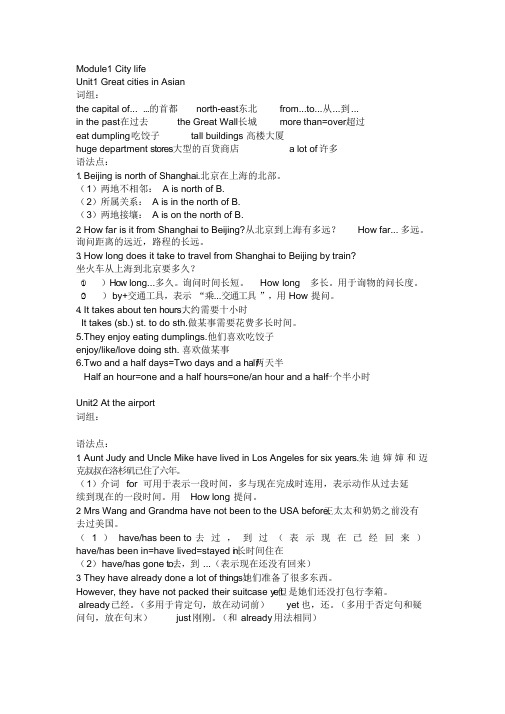
Module1 City lifeUnit1 Great cities in Asian词组:the capital of... ...的首都north-east东北from...to...从...到...in the past在过去the Great Wall长城more than=over超过eat dumpling 吃饺子tall buildings 高楼大厦huge department stores大型的百货商店 a lot of 许多语法点:1.Beijing is north of Shanghai.北京在上海的北部。
(1)两地不相邻: A is north of B.(2)所属关系:A is in the north of B.(3)两地接壤:A is on the north of B.2.How far is it from Shanghai to Beijing?从北京到上海有多远?How far... 多远。
询问距离的远近,路程的长远。
3.How long does it take to travel from Shanghai to Beijing by train?坐火车从上海到北京要多久?(1))How long...多久。
询问时间长短。
How long 多长。
用于询物的问长度。
(2))by+交通工具,表示“乘...交通工具”,用How 提问。
4.It takes about ten hours大.约需要十小时It takes (sb.) st. to do sth.做某事需要花费多长时间。
5.They enjoy eating dumplings.他们喜欢吃饺子enjoy/like/love doing sth. 喜欢做某事6.Two and a half days=Two days and a hal两f 天半Half an hour=one and a half hours=one/an hour and a ha一l f 个半小时Unit2 At the airport词组:语法点:1.Aunt Judy and Uncle Mike have lived in Los Angeles for six years.朱迪婶婶和迈克叔叔在洛杉矶已住了六年。
- 1、下载文档前请自行甄别文档内容的完整性,平台不提供额外的编辑、内容补充、找答案等附加服务。
- 2、"仅部分预览"的文档,不可在线预览部分如存在完整性等问题,可反馈申请退款(可完整预览的文档不适用该条件!)。
- 3、如文档侵犯您的权益,请联系客服反馈,我们会尽快为您处理(人工客服工作时间:9:00-18:30)。
上海牛津英语六年级预
初英语知识点整理一 HEN system office room 【HEN16H-HENS2AHENS8Q8-HENH1688】
Module 1 Family and Friends
Unit 1 Family and Relatives
一、词汇及短语
1.relative n.亲戚,亲属(是可数名词,复数形式直接-s)
. Mary is my close relative. 玛丽是我的近亲。
2.family n.家;家庭;家人(意为“家人”“家庭成员”时,谓语动词用复数;意为“家
庭”时,表示一个整体,谓语动词用单数)
. This is my family. 这是我的家。
They are my family. 他们是我的家人。
常见短语:family tree家谱
3.granddaughter n.(外)孙女
4.grandson n.孙子;外孙
5.only adv.仅仅
6.member n.成员;会员
7.shop n.商店 v.购物(shopped,shopping)
常见短语:bookshop(bookstore)书店 shopping bag购物袋 shopping centre购物中心go shopping=do some shopping去购物
8.else adv.别的,其他的
. –What else do you want? 你还要别的什么吗?
-Nothing else, thank you. 不要别的了,谢谢。
注意else与other的区别,两者意思相近,但是else一般用来修饰不定代词、疑问代词、疑问副词,并后置。
而other只能修饰名词,且放在名词前。
someone else别人 nothing else 没有其他的 who else还有谁 what else还要什么 other people其他人 other things其他东西 other places其他地方
9.badminton n.羽毛球
10.cycle n.自行车 v.骑自行车
常见短语:go to school by cycle=cycle to school骑自行车去学校
go cycling去骑自行车
go jogging慢跑
11.birthday card生日贺卡
12.watch TV/watch a film(movie)看电影/电视
13.a blank piece of paper一张白纸
14.a photo of一张…的照片
二、句子
1.Alice has got a lot of presents and birthday cards from her family and relatives.
爱丽丝从她的家人和亲戚那里收到了许多礼物和生日贺卡。
(“get…from…”从…得到…)
2.Make a birthday card for one of your family members or relatives.为你的家人或亲戚
中的一员做一张生日贺卡。
(“one of…”…其中之一)
3.I only have one aunt.我只有一个阿姨。
4.She is the only girl in her family.她是家里唯一的女孩。
5.Only three students failed in the PE examination.只有三个同学没通过体育测试。
6.Only you can help me.只有你能帮我了。
三、语法
1.How many/much…do you have?你有多少…?
. How many books do you have? 你有多少本书?
How much bread do you have? 你有多少面包?
2.What (else) do you do with…?你(还)和你的…一起做什么?
3.频度副词
always总是;永远 usually通常 often经常 sometimes有时
(1)注意频度副词在句子中的位置:
频度副词在句子中习惯上位于be动词、助动词之后,行为动词之前。
. She is always late for school. 她上学总是迟到。
He usually goes to bed at about 12. 他通常十二点睡觉。
often可以放在句中,也可放在句尾,一般不放句首。
. We have been there quite often. 我们经常到那儿去。
My grandma often goes for a walk after dinner. 我奶奶经常在晚饭后散步。
sometimes较特殊,既可以放在be动词、助动词之后,行为动词之前,也可以放在句首,还可以放在句中、句尾。
. I sometimes think that it is a great mistake. 我有时想这事一个大错误。
Sometimes I help my mother in the house. 有时候我帮助妈妈做家务。
(2)对一件事发生的频率进行提问时,要用How often…?
. How often do you go to the cinema? 你们多长时间看一次电影?。
